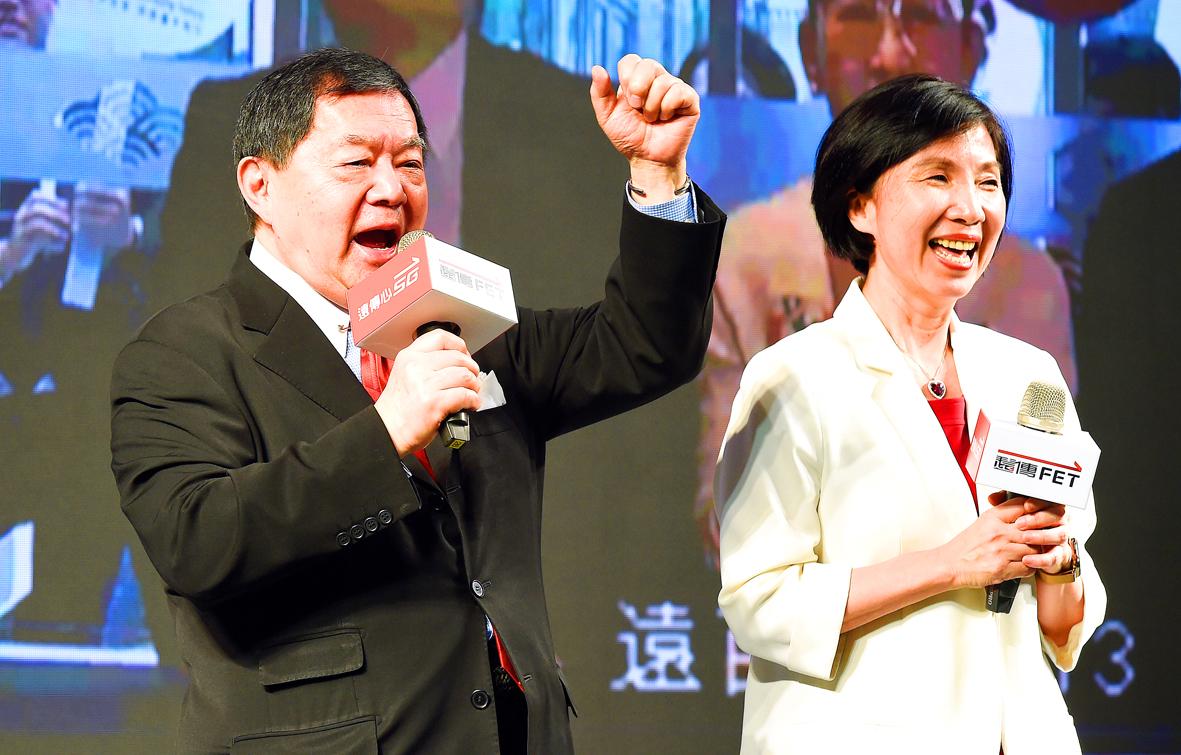Far EasTone Telecommunications Co (遠傳電信) yesterday said it plans to spend up to NT$30 billion (US$1.01 billion) on 5G network deployment over the next three years as it expects half of its mobile subscribers to migrate to 5G services by 2023.
That implies about 3.54 million subscribers switching to 5G, based on the company’s 7.08 million subscribers as of the end of February.
To meet its goal of achieving a 50 percent penetration rate for 5G, “an investment of NT$20 billion to NT$30 billion is inevitable in the first three years,” Far EasTone president Chee Ching (井琪) told a media briefing in Taipei, as the company formally started its 5G services yesterday.

Photo: Liao Chen-huei, Taipei Times
The investment does not include those allocated for private network deployment for enterprise clients, Ching said.
Far EasTone has signed an agreement to build a private network for chip designer MediaTek Inc (聯發科), with more than 40 potential enterprise clients in the pipeline, she said.
The company expects enterprise clients, which currently account for 20 percent of revenue, to gradually expand their contribution, she said.

Photo: Liao Chen-huei, Taipei Times
“Enterprise business is a growth engine for the company as a saturated consumer market is constantly driving prices lower,” Ching said.
Far EasTone said it aims to make NT$13 billion in revenue from non-telecom services this year.
It has budgeted NT$10.2 billion for capital expenditure this year, mainly for 5G network buildout.
Its target is to have more than 4,000 5G base stations installed by the end of the year, mainly in urban areas with a higher population density.
Having 1 million of its subscribers upgrade to 5G in the next 12 months is a “very achievable” goal, Ching said, adding that it would have been even easier to attain without the COVID-19 pandemic.
5G uptake might be a bit slow due to a limited selection of 5G smartphones, as fewer consumers can afford them, Ching said.
The company expects Apple Inc’s new phone and mid-range models by other brands to be launched either later this month or next month, which would help accelerate 5G subscriptions, she said.
A mid-range 5G phone would be priced between NT$15,000 and NT$20,000, she added.
Far EasTone currently offers three models — from Samsung Electronics Co, Sharp Corp and Sony Corp — which are bundled with its 5G rate plans starting from NT$599 to NT$2,699 a month, depending on data transmission speed and volume.
Consumers can get unlimited data by paying NT$1,399 a month, on par with prices offered by rivals Chunghwa Telecom Co (中華電信) and Taiwan Mobile Co (台灣大哥大).

SELL-OFF: Investors expect tariff-driven volatility as the local boarse reopens today, while analysts say government support and solid fundamentals would steady sentiment Local investors are bracing for a sharp market downturn today as the nation’s financial markets resume trading following a two-day closure for national holidays before the weekend, with sentiment rattled by US President Donald Trump’s sweeping tariff announcement. Trump’s unveiling of new “reciprocal tariffs” on Wednesday triggered a sell-off in global markets, with the FTSE Taiwan Index Futures — a benchmark for Taiwanese equities traded in Singapore — tumbling 9.2 percent over the past two sessions. Meanwhile, the American depositary receipts (ADRs) of Taiwan Semiconductor Manufacturing Co (TSMC, 台積電), the most heavily weighted stock on the TAIEX, plunged 13.8 percent in

A wave of stop-loss selling and panic selling hit Taiwan's stock market at its opening today, with the weighted index plunging 2,086 points — a drop of more than 9.7 percent — marking the largest intraday point and percentage loss on record. The index bottomed out at 19,212.02, while futures were locked limit-down, with more than 1,000 stocks hitting their daily drop limit. Three heavyweight stocks — Taiwan Semiconductor Manufacturing Co (TSMC, 台積電), Hon Hai Precision Industry Co (Foxconn, 鴻海精密) and MediaTek (聯發科) — hit their limit-down prices as soon as the market opened, falling to NT$848 (US$25.54), NT$138.5 and NT$1,295 respectively. TSMC's

TARIFFS: The global ‘panic atmosphere remains strong,’ and foreign investors have continued to sell their holdings since the start of the year, the Ministry of Finance said The government yesterday authorized the activation of its NT$500 billion (US$15.15 billion) National Stabilization Fund (NSF) to prop up the local stock market after two days of sharp falls in reaction to US President Donald Trump’s new import tariffs. The Ministry of Finance said in a statement after the market close that the steering committee of the fund had been given the go-ahead to intervene in the market to bolster Taiwanese shares in a time of crisis. The fund has been authorized to use its assets “to carry out market stabilization tasks as appropriate to maintain the stability of Taiwan’s

In a small town in Paraguay, a showdown is brewing between traditional producers of yerba mate, a bitter herbal tea popular across South America, and miners of a shinier treasure: gold. A rush for the precious metal is pitting mate growers and indigenous groups against the expanding operations of small-scale miners who, until recently, were their neighbors, not nemeses. “They [the miners] have destroyed everything... The canals, springs, swamps,” said Vidal Britez, president of the Yerba Mate Producers’ Association of the town of Paso Yobai, about 210km east of capital Asuncion. “You can see the pollution from the dead fish.